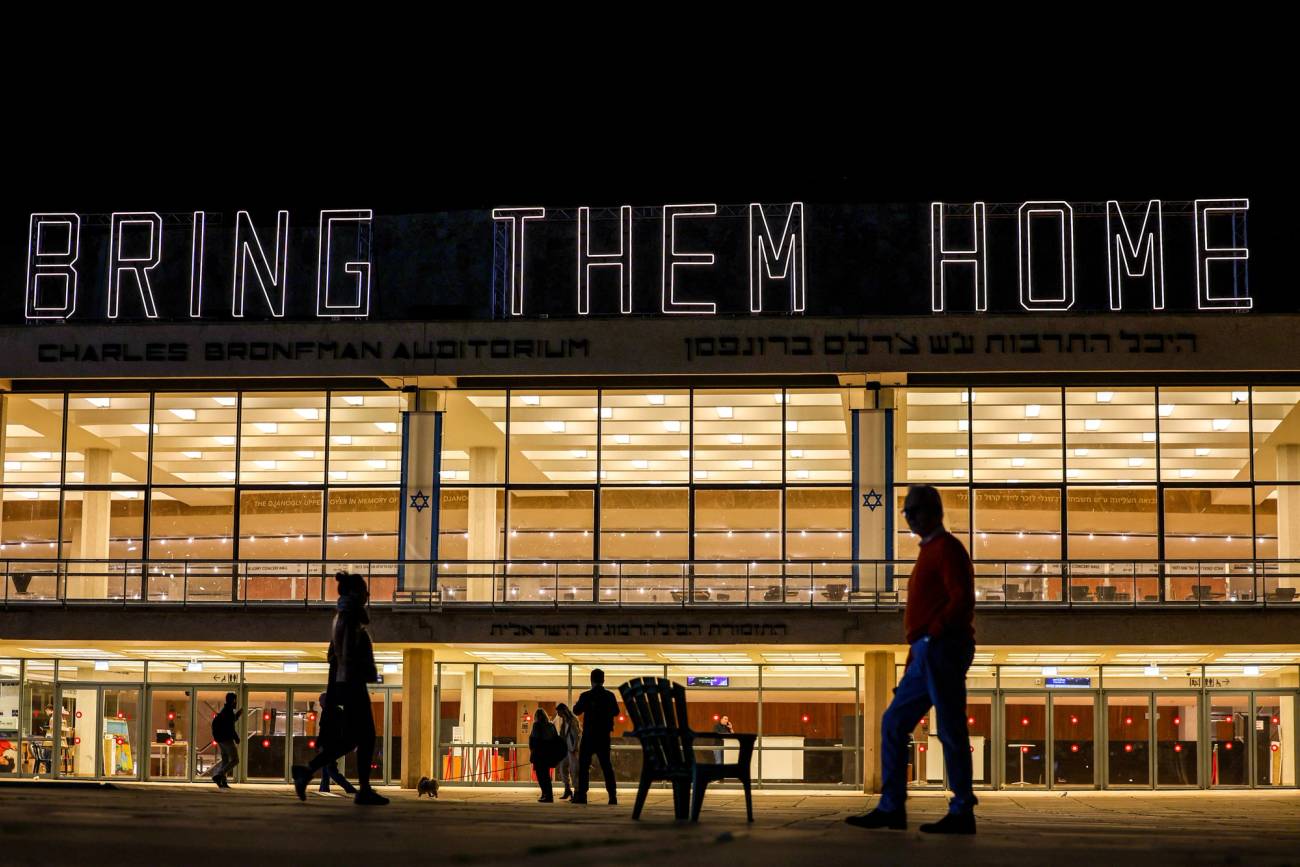Life During Wartime
The view from the boulevards, buses, and Zumba classes of Tel Aviv

Ahmad Gharabli/AFP via Getty Images

Ahmad Gharabli/AFP via Getty Images

Ahmad Gharabli/AFP via Getty Images
Ever since Oct. 7, life in Israel hasn’t been the same. But in all honesty, this is not how I pictured war. Here are three glimpses into the insane absurdity of life during wartime in the 21st century.
1.
One of the most difficult days for me since the war started was Dec. 15, when three Israeli hostages were mistakenly shot dead by the IDF. The horrible and unbearably frustrating tragedy aside, it was difficult for me because one of them was 28-year-old Yotam Haim. I didn’t know him personally, but he was the hostage I was most attached to.
Around 250 people were abducted to the Gaza Strip on Oct. 7. Since then, we see their faces every day on every corner in Tel Aviv. The posters are plastered everywhere and as time goes by you learn their names and their stories. We don’t know or remember all the hostages; we’re not emotionally invested in all of them. It seems that every Israeli has their “favorite” hostage; the one they worry about, the one they are elated if released, and mourn if killed. Our saturated and bizarre media environment has turned the hostages into characters, figures from some obscene reality show we’ve all suddenly been forced to watch.
No person’s life is worth more than another—we know that—but the human psyche is selective. You can’t be emotionally attached to a crowd, only to individuals. The entire country, and many around the world, hold their breath in anticipation of the release of the baby hostage Kfir Bibas and his 4-year-old brother Ariel, and pray for their safe return. Dog lovers fell in love with 17-year-old Mia Leimberg, who became famous for being held hostage, and freed, together with her Shih Tzu dog, Bella.
My hostage was Yotam Haim. Ever since I saw his poster pinned up in the drum department of the music shop I frequent with my kids, I couldn’t get him out of my mind. While my son was trying out a drum kit, I stared at the poster showing a cute young drummer with a mane of red hair, trying to fight the tears. I didn’t know Yotam Haim, but I felt as if I did.
On Dec. 15, my Facebook feed was swamped with posts about Yotam. Since he was a musician, many in my social circle knew him personally, or—like me—felt as if they did. Yotam was the drummer with metal band Persephore, who were supposed to play a show as part of a metal festival at the Gagarin club in Tel Aviv on Saturday night, Oct. 7.
The heart cannot contain the sorrow for all the kidnapped and all the dead. Living in Israel at the moment, you have to develop a thick skin just to make it through the day. When I read that Yotam Haim was killed, I withered.
2.
Many songs have been written about the Hamas attack and about this war since it started. Freed teenage hostage Mia Leimberg even released a duet with Israeli rock star Aviv Geffen. But the most successful one by far is the hip-hop war anthem “Charbu Darbu” by the hottest new rap duo in the country, Ness ve Stilla, released five weeks after Oct. 7.

In an Instagram post accompanying the release, the two explained that “it’s time to replace sadness with anger.” Many Israelis felt the same, and the song shot quickly to No. 1 in the charts. Ness Ve Stilla replaced sadness with anger by writing an extremely vitriolic and militaristic song, cheering on the IDF on their mission to obliterate Hamas. If you’re not that young and hormonal, and if you dream of peace and not of raining hell, this song is quite shocking.
The first thing that any Israeli over 22 asked is: What’s Charbu Darbu? The song makes the meaning abundantly clear. The title is criminal slang meaning something like “destroy ’em” (it’s actually a distortion of the Arabic phrase “harb u-darb” meaning “war and strike”). This slang phrase became associated with the Israel-Hamas war after a recording of an IDF commander instructing his soldiers was published online. The commander fired his subordinates up with the words, “Our mission is to attack and defeat Hamas ... Charbu Darbu!”
Since, like the title, most of the lyrics are slang, it’s difficult to translate them, but let’s just say that at one point, Stilla goes “tfee”—the Hebrew equivalent of the English “ptui,” meaning a spit of hatred and contempt—and calls Hamas “Bnei Amalek” (sons of Amalek), referencing the biblical archetypal enemy of the Jews, and the symbol of all evil. This is not without context: Benjamin Netanyahu also compared Hamas to the Amalekites in a letter to the soldiers he published at the beginning of November.
Hip-hop aficionados will tell you that the song belongs to the Drill subgenre originating in Chicago—think trap sound with gangsta rap lyrics—replacing confrontational poetry about crime and street gangs in Chicago with a cry for vengeance against Hamas. Drill is known for violent lyrics dissing the enemy as disrespectfully as possible, thus it’s the perfect genre to express retaliatory aggression. But then again, it’s weird and unsettling to spur on the IDF as if they’re a gang in an American inner city.
For a while, I could more or less ignore this callous hit—until my Zumba instructor decided to add it to our playlist. The fact that people are doing Zumba during wartime, of course, is strange in itself. On Oct. 7, our gym, like all others across the country, closed its doors, only to reopen about two weeks later. We have a shelter at the gym that we run to when sirens go off. At first there was still no Zumba class; quieter, less-cheerful forms of exercise seemed more appropriate. After a while, Zumba, too, resumed. This gradual reemergence of activities is eerily reminiscent of COVID days—only for other reasons and with a different set of fear, anxiety, and sadness attached to it.
So now we regularly dance to “Charbu Darbu” at Zumba, between Dua Lipa’s “Dance the Night” and “Mas Que Nada” by Sergio Mendes featuring the Black Eyed Peas. I doubt anyone in the class noticed the irony: Dua Lipa herself is name-checked and lambasted in “Charbu Darbu” due to her pro-Palestine stance, together with Bella Hadid and porn star Mia Khalifa. Our instructor’s original choreography for the new war favorite, by the way, includes hip-hop dance moves plus military salutes and, of course, gun shooting gestures.
I understand that the point of “Charbu Darbu” is boosting morale, but a song that puts the Israel-Hamas war in the context of gang warfare feels wrong. And the idea of dancing to a song about taking revenge on Hamas, as if this is a joyous occasion, also makes me squirm.
It seems, though, that I’m the only one. Saying that the women (and especially the young girls) in my Zumba class are into “Charbu Darbu” is quite an understatement. They go especially crazy in the part that roll calls combat units—Golani! Givati! etc.—each brigade name accompanied by the chant “one, two, shoot!”
I want to scream at the other women: Do you really feel the pleasure of revenge, or aren’t you listening to the lyrics? Don’t you care about lives lost on both sides, or is this just Zumba-adrenaline talking? But instead of screaming, I look at the floor and half-assedly go through the motions, hoping not to get noticed in my lack of enthusiasm, and wait for the song to be over.
3.
I would have thought that war is war and life is life, but since Oct. 7, the war isn’t going on only in Gaza or the northern border, or when the sirens wail and we run to the shelter, or even while watching the news or scrolling social media. The war invades every public space with unbridled persistence. A new and seemingly irrelevant layer is constantly added to normal everyday objects and experiences.
The recorded announcement you hear on the bus, for instance, used to remind you to electronically pay your bus fare; now it tells you that you need to do so “even during wartime.” It also says: “In regular times and in times of emergency, we are at your service. We will get through this together.” And even before getting on the bus, the electronic sign above the windshield that is supposed to convey the bus’s destination, communicates something else; every now and then it changes to the slogan “together we will win” and then, quickly, flickers back again, like it’s trying to hypnotize you.

Courtesy the author
It gets even more confusing and disconcerting when seemingly happy signifiers suddenly mean something else. Above the Tel Aviv Culture Center, in HaBima Square, is a huge, illuminated sign in Broadway lights, but it doesn’t advertise a new musical stage show; it says, in English, “Bring Them Home.” And a few days ago, Rothschild Boulevard was decorated with pink balloons. As to be expected, the balloons signified a birthday, but announcements on the boulevard indicated that the birthday “party” was for hostage Eviatar David, who was kidnapped by Hamas at the Nova desert rave. He didn’t see his birthday balloons because on Dec. 28, he turned 23 in captivity.
These strange and upsetting reminders pop up continuously in ever-escalating proportions of awkward inappropriateness. Payment apps assure you that together we will win (whatever that means); teenage ex-hostages released from captivity are talking casually on TikTok about what they went through (while psychologists on morning shows explain that the fact that they’re seemingly fine is most worrisome); fashion designers are printing Oct. 7 on sleeves of trendy, over-priced sweaters; Anita ice cream has added a new flavor called Am Yisrael Chai (meaning “the nation of Israel lives”), a halvah-flavored declaration of resilience in the face of the Hamas attack.
The days are passing. With each life lost, our day-to-day existence is becoming more and more depressing. A friend yesterday told me that I better get used to it because this is “the new normal.” Acknowledging the situation in some way or other has become standard procedure in any Israeli company or business. Everywhere you look you see or hear something that feels vulgar and wrong, either by seemingly using the war and national unity as an advertising slogan, or by introducing war-related themes into fun products because people feel it’s not OK to just ignore it.
This, apparently, is what war looks like in a developed country today. It’s no less grave or tragic than it’s been throughout history—it’s just more surreal.
Dana Kessler has written for Maariv, Haaretz, Yediot Aharonot, and other Israeli publications. She is based in Tel Aviv.